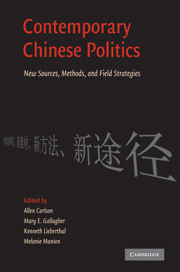Book contents
- Frontmatter
- Contents
- Tables and Figures
- Contributors
- Abbreviations
- Introduction
- Part I Sources
- 1 State-Generated Data and Contentious Politics in China
- 2 Why Archives?
- 3 The Central Committee, Past and Present
- 4 Experimental Methods and Psychological Measures in the Study of Chinese Foreign Policy
- 5 Internet Resources and the Study of Chinese Foreign Relations
- 6 Information Overload?
- Part II Qualitative Methods
- Part III Survey Methods
- Reflections on the Evolution of the China Field in Political Science
- Glossary
- References
- Index
6 - Information Overload?
Collecting, Managing, and Analyzing Chinese Media Content
Published online by Cambridge University Press: 05 June 2012
- Frontmatter
- Contents
- Tables and Figures
- Contributors
- Abbreviations
- Introduction
- Part I Sources
- 1 State-Generated Data and Contentious Politics in China
- 2 Why Archives?
- 3 The Central Committee, Past and Present
- 4 Experimental Methods and Psychological Measures in the Study of Chinese Foreign Policy
- 5 Internet Resources and the Study of Chinese Foreign Relations
- 6 Information Overload?
- Part II Qualitative Methods
- Part III Survey Methods
- Reflections on the Evolution of the China Field in Political Science
- Glossary
- References
- Index
Summary
Only two decades ago the main information source for China scholars abroad was the Foreign Broadcast Information Service (FBIS), an open intelligence source of the CIA. FBIS collected, translated, and disseminated available news and information from Chinese media sources. During the Cultural Revolution most foreign researchers were not allowed to conduct fieldwork in China; the five-times-weekly FBIS report thus constituted one of the main sources for information about events in the mainland. Since original media sources only became available during the reform era, those interested in Chinese media reporting usually relied on the information selected and translated by FBIS. Aimed at the U.S. intelligence community, FBIS did not draw an unbiased and representative sample of the Chinese news, but, at the time, it constituted one of the best information sources available to the research community abroad.
Today, the situation could not be more different. Since China’s opening up to the outside world, we have the opportunity to spend extensive time in the country reading, listening, and watching the same news as Chinese citizens. Even when we are not in China, we can access a large number of Chinese media sources electronically using the Internet, cable, or satellite dishes. In addition to increased access, we also have the opportunity to store this information. We can mail abroad newspapers, magazines, and DVDs from China, scan documents, download files, and record television and radio programs. Most of this information is stored electronically. Once preserved, the data gathered in countless hours sit on our hard drives, waiting for analysis. Instead of reading the FBIS report, we simply access a folder on a computer and immediately have data available for research. What a wonderful world for doing research on China – or so it would seem.
- Type
- Chapter
- Information
- Contemporary Chinese PoliticsNew Sources, Methods, and Field Strategies, pp. 107 - 126Publisher: Cambridge University PressPrint publication year: 2010
- 9
- Cited by



